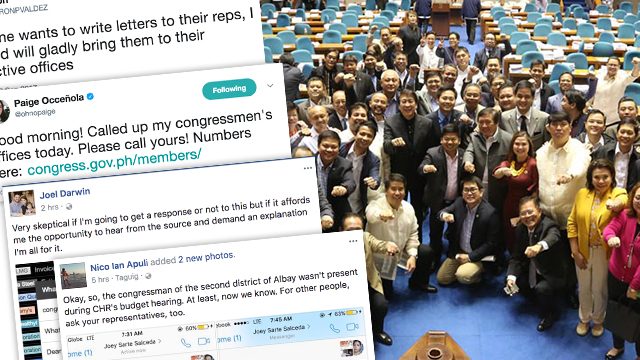SUMMARY
This is AI generated summarization, which may have errors. For context, always refer to the full article.

MANILA, Philippine – How did you vote on the proposed 2018 budget of the Commission on Human Rights (CHR)?
Many Filipinos threw this question to their district or sectoral representatives in the House of Representatives after 119 lawmakers voted in favor of allocating the constitutional body a budget of only P1,000 for next year. Only 32 legislators voted against it.
In just a few hours since the news was reported, the hashtag #CHRBudgetCheaper quickly made rounds online as netizens slammed the lawmakers who voted for the measly annual budget. For the netizens, the budget reflected how lawmakers value their constituents’ human rights.
Online clamor
The online clamor did not stop there.
In a bid to demand answers and hold their representatives accountable for their actions, citizens have also emailed and sent messages to their congressional representatives.
This, they said, was their way of showing their personal position on the controversial issue. It was also a way to check if their district or sectoral representative represents their own interests.
Here are a few posts about it:
Good morning! Called up my congressmen’s offices today. Please call yours! Numbers here: https://t.co/Y3v1R80Zof
— Paige Occeñola (@ohnopaige) September 13, 2017
Hold them accountable
How did your representative vote in the budget deliberations?
Hold them accountable by asking them about their vote and their motivations. Did they vote for or against? Did they choose to abstain? Why? If they were absent, why? How would they have voted if they were there?
Here are a few ways to reach out to your respective congressional representative:
-
Call them. As public servants, your congressmen are obligated to answer to their constituents.The House of Representatives keeps a directory of the offices of each lawmaker. Check the directory here.
-
Send a snail mail. No one is picking up your call? Send a letter to their respective offices! You can check their official address also in the same public directory published on the House website. After, you can tap a courier to send your letter. Alternatively, a netizen also volunteered to take up the task and deliver the letters to their offices.
if anyone wants to write letters to their reps, I can and will gladly bring them to their respective offices
— aaron (@AARONPVALDEZ) September 12, 2017
-
Post on social media. If all else fails, you can go to social media. Many, if not all, lawmakers have official social media accounts on Facebook and Twitter. Look for their accounts and ask them on those platforms. You can choose to engage them publicly by tagging them or posting on their walls or by sending them a private message.
Once you’ve done your part as a responsible citizen of the country, the next step is to wait.
MovePH, Rappler’s civic engagement arm, is crowdsourcing the statements of congressmen regarding their vote on the CHR budget.
If you have reached out to your representative at the Congress, fill out this form:
The budget deliberations are far from over. After the House, the proposed national budget will be tackled at the Senate which will have its own version of the budget proposal.
After that, both chambers of the Congress will have to finalize the budget bill in a bicameral conference committee.
Until the President signs the General Appropriations Act, there are ways for Filipinos to register their position on the ongoing budget deliberations. Make your voice count. – Rappler.com
Did you ask your district or sectoral congressman about their vote in the budget deliberations? Share your experience engaging with them on X!
Add a comment
How does this make you feel?
There are no comments yet. Add your comment to start the conversation.